Freeing the Meghna from Grabbers: Act or get sued
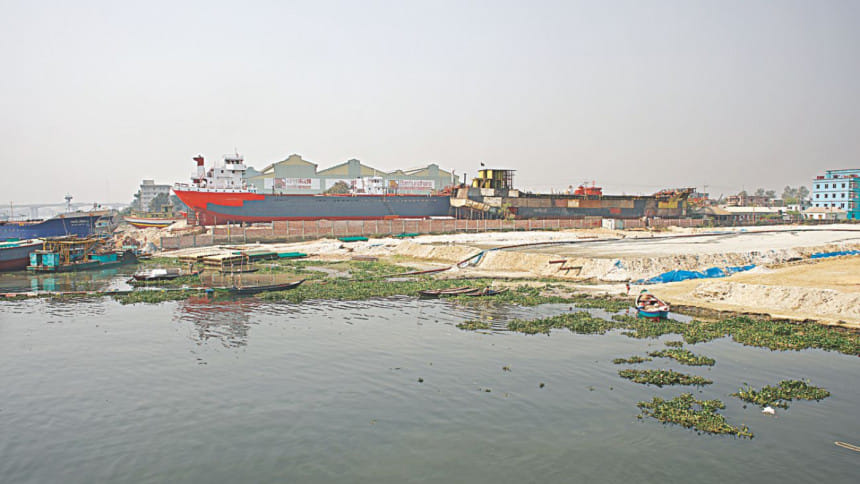
The National River Conservation Commission has warned that it would take legal actions against at least a dozen government authorities for their inaction to free the Meghna from grabbers if they do not act within seven days.
The commission had earlier directed the authorities to take action against the grabbers but nothing happened since then. A few days before that, on February 9, The Daily Star ran a report on river-grabbing.
Frustrated, the commission on May 13 issued these latest warnings, three days after this paper carried yet another report on encroachment by powerful businesses.
“Grabbing a river is a criminal offence and so is the authorities’ connivance with the grabbers,” said a fuming Muzibur Rahman Howlader, chairman of the commission, at his office late last week.
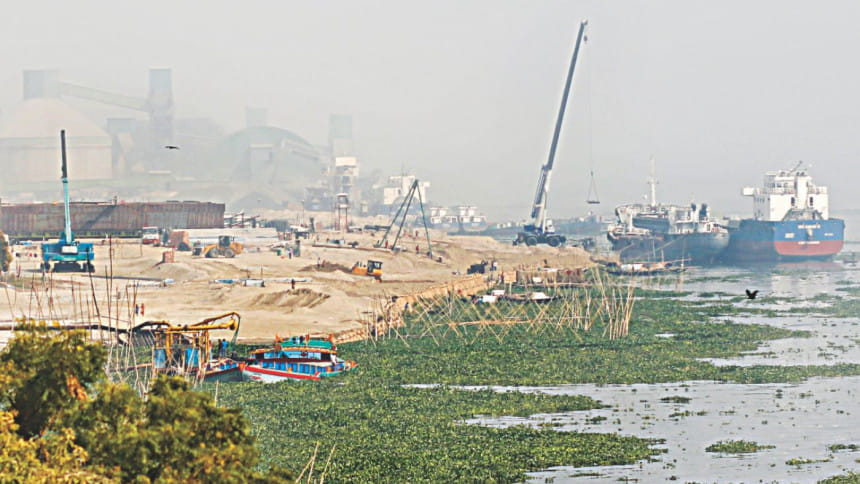
“I have talked to the deputy commissioners and the BIWTA chairman, and Narayanganj river port officer directly and over phone several times on several occasions and requested them to take action to free the Meghna from the ruthless grabbers. But alas, to no avail!” he told this correspondent.
He said negligence and apathy towards enforcing river-protection laws were causing the plundering and destruction of rivers like the Meghna, Shitalakkhya, Turag, and the Balu.
Despite the commission’s fervent calls and media exposé of powerful businesses and conglomerates occupying the river, over a dozen government authorities have oddly been silent. The commission three months ago had asked Bangladesh Inland Water Transport Authority (BIWTA) and the district administrations of Narayanganj and Munshiganj to evict the Meghna grabbers within seven days.
The commission in its May 13 letter warned the authorities of legal consequences if they continued to fail to protect the rivers.
The commission is mandated to prevent illegal grabbing and pollution of rivers, building of illegal structures on rivers, and ensure their natural flow and navigability, conservation, and multi-purpose uses for economic and social development.
The law, however, does not empower the commission to punish the authorities. It says the commission can make only recommendations.
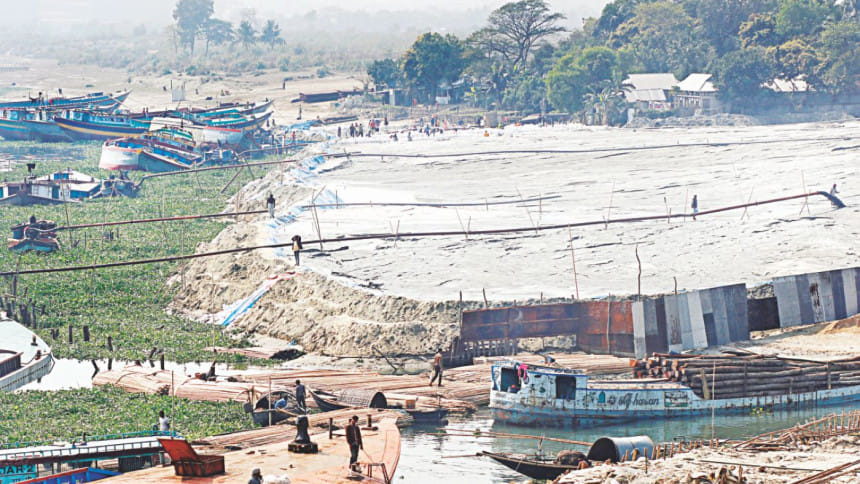
The relevant ministries have the power to punish.
However, the commission can go to court seeking remedy or for further orders.
A High Court bench in a landmark judgment on February 3 declared that a river is a “person” and gave the National River Conservation Commission the legal guardianship of all rivers in the country.
The court directed the government to amend the National River Conservation Commission Act, 2013, incorporating stringent punitive provisions to make the commission effective in protecting rivers and water bodies.
The grabbers and polluters have moved on to the Meghna after almost killing the four rivers around the capital.
Commission Chairman Howlader said every level of the government was aware of the grabbing of the Meghna and other rivers. He had raised the issue several times at meetings with national river taskforce led by the state minister for shipping and also at a meeting with principal secretary to the prime minister.
“There was no response, no satisfactory answer to my concerns,” he said, adding, “We will write to the Cabinet Division to know why the river custodians failed to protect rivers ... .”
The commission on May 13 called upon the BIWTA chairman, deputy commissioner of Narayanganj, and director generals of Bangladesh Water Development Board and the Department of Environment to save the Meghna.
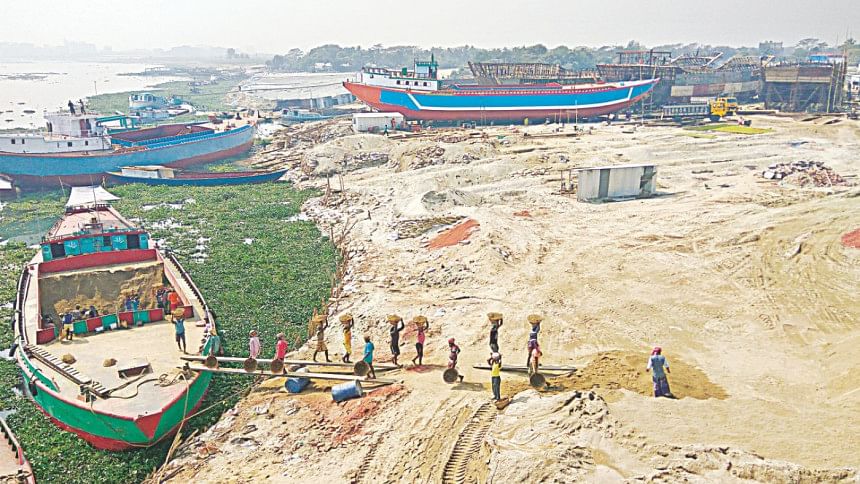
Citing its inspection findings, the commission identified Ananda Shipyard and Khan Brothers Slipways and named about a dozen other business conglomerates to have grabbed the Meghna in Protaper Char in Sonargaon and the upstream of Meghna Bridge.
It identified Meghna Dockyard for filling up the river downstream of the bridge and a private economic zone for occupying about 50 acres at Hosendi.
The commission lamented that taking advantage of authorities’ inaction over past three months, the grabbers had an unhindered pace in gobbling up the river.
“The BIWTA’s inaction, on the plea that they could not carry out eviction drives due to the unavailability of excavators, is regrettable and a demonstration of negligence of its duty that has encouraged river grabbing,” read the commission letter.
The commission again asked the authorities to evict Ananda Shipyard and Khan Brothers Slipways and all other grabbers within seven working days and submit a progress report with the commission.
“... Or, the commission will be compelled to take legal action against the authorities’ failure,” read the letter.
The commission had gone for the inspection after The Daily Star report on February 9. It inspected the Meghna, Shitalakkhya, and the Dhaleshwari with officials from the BIWTA and district administration.
In a report dated February 18, the commission identified specific incident of river grabbing by Khan Brothers Slipways and Engineering Works, approximately 40 acres at Char Betagi in Gazaria.
The report named about a dozen other cement factories, factories, ship-builders, group of companies, and power plants as grabbers of a huge expanse of the river at and around the Meghna Bridge.
The copy of the February 18 letter and report, was also sent to the cabinet secretary, secretaries to shipping, land, water resources, industries ministries and executive director of the Bangladesh Economic Zones Authority.
Md Gulzar Ali, BIWTA joint director and port officer of Narayanganj river port, said they could not have an eviction drive as they had no excavators available. The BIWTA only has two.
As to why one was not rented, he said the rents were high but he could not say how much.
Gulzar said they got and would have an excavator available for a drive tomorrow.
Saila Farzana, deputy commissioner of Munshiganj, said, “I admit that we have not done it as we have been busy with other work. Since you have raised it, we will initiate some actions to free the Meghna after Eid holidays.”
Asked what held her back this long, she said, “I cannot tell you everything, it is not an easy task to free the rivers of grabbers.”
Some well-known business conglomerates were claiming the land of the river by not putting up any signboard, which makes taking action against the culprits difficult.
She said even though unacceptable, the grabbers at times show up with title deeds and court documents regarding ongoing cases.
“Individuals or companies cannot be owners of rivers and canals,” she said.
Narayanganj Deputy Commissioner Rabbi Miah could not be reached for comments despite repeated phone calls and text messages.

 For all latest news, follow The Daily Star's Google News channel.
For all latest news, follow The Daily Star's Google News channel. 




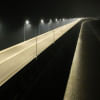

Comments